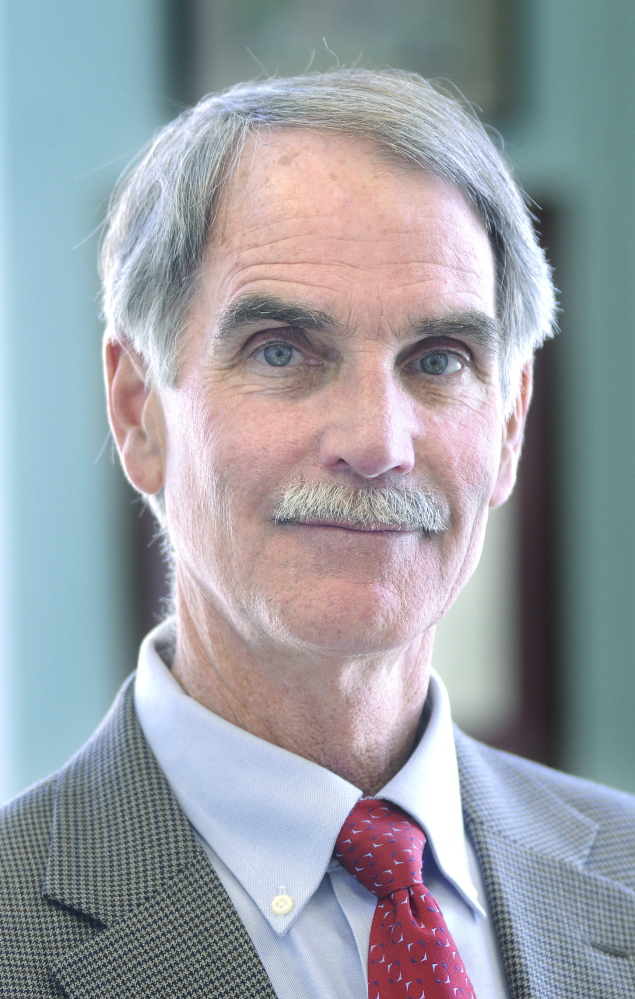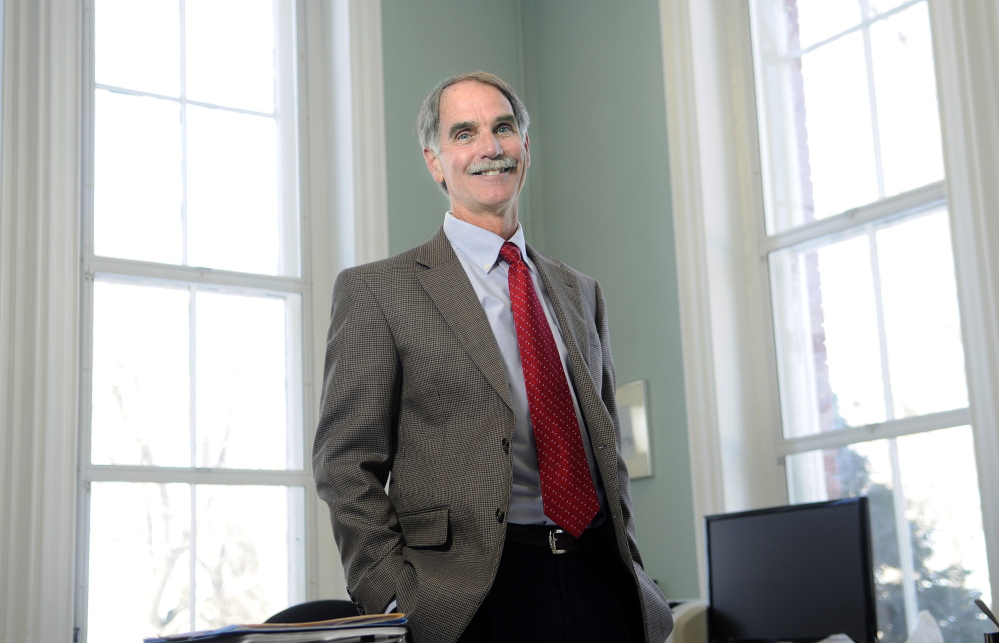READFIELD — Pat McInerney grew up in one big family, the fourth of eight children.
He has spent most of his adult life in a big family of a very different sort, and last month he became its patriarch.
McInerney, the new head of Kents Hill School, has spent his career working in independent schools, most of them boarding schools, seeking the sort of community and connections he experienced as a boarding school student in western Massachusetts.
McInerney attended Bates College and worked at several other independent schools before arriving at Kents Hill in 1992, when he was hired by longtime Head of School Rist Bonnefond as a biology teacher and assistant head of school.
After a long period of stability in leadership during Bonnefond’s 21-year tenure, Kents Hill has gone through two transitions in relatively short order. The Board of Trustees appointed Jeremy LaCasse to succeed Bonnefond in 2011 but decided not to renew his contract last year, elevating McInerney to acting head of school.
The board elected McInerney the 19th head of Kents Hill in February.
McInerney will maintain some responsibility for the sort of day-to-day administrative tasks that were central to his job as associate headmaster, while also taking on duties such as fundraising, working with the trustees and overseeing the development of a new strategic plan, which will begin in April and wrap up this fall.
In addition to teaching and working in administration, McInerney has coached boys’ varsity soccer and boys’ varsity tennis for 20 years and also coached the ski team. With his new duties, he has stepped back from coaching soccer and is teaching his last advanced-placement biology class. He plans to continue coaching the boys’ tennis team, which has fewer players and a shorter schedule.
McInerney has two adult sons who attended Kents Hill. His wife, Cindy, has worked in a variety of roles at the school, including as head of the art department and in admissions. She’s now a tutor at the Akin Learning Center, which provides support for students with learning disabilities.
In the middle of Kents Hill’s three-week spring break last week, McInerney answered questions from the Kennebec Journal about his path to becoming head of school and Kents Hill’s next steps.
Q: When did you know that you wanted to go into education?
A: Probably when I was in high school. I had a number of teacher-coaches, because one of the things you do at independent schools is you are a teacher, but you’re almost always a teacher, coach and parent. It’s what we call a triple threat.
And having had some of those in my high school, I really liked them as teachers and I had them as tennis coaches or ski coaches. I got to know them in a complete way, and they seemed to have a real impact on me and what I wanted to do, so I thought that would be a wonderful lifestyle: being involved with kids, in education.
When I got to college, I thought about medical school for a while. My dad was a doctor; I have two brothers who are doctors; so that was pretty common in my family. But I decided that I wanted to do education.
How has it matched up with your expectations?
Early on, what I found was that teaching four or five sections of biology was great, and I really liked it, but it was a little repetitive. If you teach English, you can go with a whole other series of books, or you can go with a different poet or whatever. When I started thinking about doing this every day for the next 40 years, I decided that still doing some of that, but also being in administration would be a nice combination.
How has being head of school been different?
I had a pretty good sense of what a headmaster does, but it’s different doing it than you think. And so early on, I had 80 percent a very good sense and maybe 20 percent not. And I would probably change that to 70-30 now, in terms of having gone through the role.
There are just some things that it’s only this office that deals with it, no matter how much you can and should delegate. There are things that just, the buck stops here, so to speak. I guess the best example would be the board of trustees. …
My understanding of the day-to-day running of the school is no different. It’s the kind of bigger-picture, long-term, visionary aspects of school life that fall on this office more than anywhere else.
What have you enjoyed most about working in administration?
As I said earlier, teaching is very logical, organized, and the expectations are very clear. If you’re doing algebra, biology or English, you start in September, you have a few tests, you have a few quizzes. It’s a very predictable life. Obviously the discussion you have this year about a topic will be different than the one you had last year because you have different kids in the classroom, but it’s pretty similar.
When you get into administration, you have absolutely no idea what’s going to happen in the next minute. We’re sitting here now, and the fire alarm may go off, and we may be out there over at one of the dorms dealing with a fire in a stove or something. It may be that a faculty member or a student has a major crisis in their family, and if that happens it immediately becomes something you deal with as an administrator. Medical situations for kids, for faculty.
I guess in the administrative life, it’s very unpredictable, but it’s also very rewarding because of that. You’re often dealing with very difficult situations, and if you can resolve them in a positive manner, that’s really for the best for the students, for the faculty, for the families.
Do you have a philosophy of education, some belief or approach that’s guided you?
I guess my education philosophy is you want to meet every student where they arrive — whether that’s in biology or that’s in skiing or that’s in their personal hygiene if they’re a ninth-grade boy — and move them forward in all those areas and recognize that everybody can be pushed and that you need to push them and that they’ll get better with support.
You really need to challenge kids. Whether that’s in biology and making sure they go on to take AP biology or whatever so they can take a further course. On the other end, we have a learning center. We have some kids who have problems with math or problems with writing. They may never get to the same place, so you get them to the furthest they can go.
What do you feel sets Kents Hill apart from other independent schools?
I guess the sense of community. And I’ll combine that with what I said just a second ago, a sense of community with a range of kids.
I think there are other very good independent schools who deal just with the top-notch kids — Exeter, Andover, Hotchkiss. The kids are going off to Harvard and Yale and Princeton. And they may have a wonderful sense of community.
There are other schools that deal with international kids, so all they have is international kids. That’s not our case; that’s not something we want to be.
The Landmark School, an excellent, excellent school outside of Boston, is for kids with learning differences. They may have a very nice program there.
But with our range of students, I think frankly the range of students helps us to build a very warm, friendly, familylike environment where everybody has got everybody’s back, whether it’s kids or faculty or whatever. And it really is palpable.
What lies ahead? What has the board asked of you? What are you going to be focusing on?
I was appointed as kind of an interim for a year. So there I am, just kind of treading water, so to speak. You don’t do a lot when you’re an interim.
A month ago, I was appointed to move forward. So if you think about that from a school perspective, if you work here, you’re like, âOK, Rist is here and then he’s not. Jeremy’s here and then he’s not. Now Pat’s here. Is he going to be there or not?’ I think a lot of people both internally and externally are saying, âWhere are we going as a school?’
We just announced that we’re going to start a strategic plan. We’re going to look over the next eight months at every aspect of the school. We’re going to hire an outside consultant to help us do this. …
It’s not just like, we think we need a new dorm. Well, great. Why do you want a new dorm? How does that relate to your programs? How does that relate to your residential life? Et cetera. Same for a science building. Why? What are the reasons? Are we going to do STEM (science, technology, engineering and mathematics) or STEAM (science, technology, engineering, arts and mathematics) or some other program that’s going to make us want to do this? We have a wonderful environmental science program. Are we going to build an environmental science building? The dining hall is older. We eat three meals a day in the dining hall; should that be next?
So what the strategic plan will do is give us a better sense of where we’re headed over the next four or five years and why. …
We need to continue to raise money. We are a nonprofit. The buildings on campus are paid for by donations by generous alumni and past parents and current parents.
The regular budget is just done year-to-year based on tuition and revenues that we get from renting the hockey arena and whatever else we do. But for those major things like having a new dining hall or science building, we need to continue to talk with families and do some fundraising; so that will continue.
Even though you’re doing a strategic plan, everything else continues. You’re teaching and coaching, and kids are going to classes and the usual stuff.
With this leadership transition, it probably helps that you’ve been here so long.
It does. A simple example is when you go to raise money, if you don’t know the parents, and you don’t know the kid, it’s a little hard to raise money. If I put myself into Jeremy’s shoes last year, he’s going to visit the parents of someone who graduated three years ago.
My wife, Cindy, and I know every kid that’s graduated in the last 21 years, and we knew their parents because we knew them when they were here as parents. … I think the kind of institutional memory is something very useful for Cindy and I to have in these roles.
Susan McMillan — 621-5645 smcmillan@centralmaine.com Twitter: @s_e_mcmillan
Send questions/comments to the editors.




Success. Please wait for the page to reload. If the page does not reload within 5 seconds, please refresh the page.
Enter your email and password to access comments.
Hi, to comment on stories you must . This profile is in addition to your subscription and website login.
Already have a commenting profile? .
Invalid username/password.
Please check your email to confirm and complete your registration.
Only subscribers are eligible to post comments. Please subscribe or login first for digital access. Here’s why.
Use the form below to reset your password. When you've submitted your account email, we will send an email with a reset code.